The Hill’s Morning Report – Biden to talk infrastructure amid border, voting controversies

Welcome to The Hill’s Morning Report. Today is Monday! We get you up to speed on the most important developments in politics and policy, plus trends to watch. Alexis Simendinger and Al Weaver are the co-creators. Readers can find us on Twitter @asimendinger and @alweaver22. Please recommend the Morning Report to friends and let us know what you think. CLICK HERE to subscribe!
Total U.S. coronavirus deaths reported as of this morning: 549,335.
More than 28 percent of the U.S. population as of this morning has received at least one dose of a COVID-19 vaccine and 15.5 percent are fully vaccinated, according to the Bloomberg News global vaccine tracker.
President Biden’s focus on COVID-19 and the economy has been splintered by a thousand other worries and developing policy challenges. After weeks of buildup, the president will talk about something on Wednesday he hopes can attract Republican support and swing the national conversation back into his wheelhouse: infrastructure.
Biden in the last week has been peppered with emotional questions about the migrant surge at the U.S. southern border, pending federal gun background check legislation and his call for resumption of an assault weapons ban, plus a new voting rights law in Georgia he called “un-American.”
The president’s plan to rescue decaying roads, bridges and airports involves an estimated $3 trillion plan so mammoth that he will break it into at least two presentations this spring, possibly also including a budget summary to send to Congress.
The administration’s infrastructure ideas, intended to be largely bipartisan, are expected to form the centerpiece of Wednesday’s speech. Another Biden proposal in April would include child care and health care programs, among other investment priorities, White House press secretary Jen Psaki said on “Fox News Sunday.”
The president’s team and progressives in Congress envision tax increases on higher-income households and businesses to help pay for the programs, although the White House has yet to lay out its tax strategy. The president declined to discuss his approach with reporters on Sunday. Psaki left open the possibility that elements of the president’s next spending proposals could be pursued in one legislative package (The Wall Street Journal and NBC News).
Simultaneously, Congress is preparing for a major battle over a voting rights bill (NBC News). At issue is the fate of the House-passed For the People Act that would remake American elections from start to finish. It would force states to offer at least 15 days of early voting, universal access to mail-in voting and same-day registration for federal races. It also would make Election Day a national holiday.
Biden and Democrats say federal intervention is needed to stop Republicans from reviving racist Jim Crow-style restrictions that make it harder for minorities to vote. Republicans say Democrats are executing a power grab to remove necessary protections on the voting process and usurp authority from states.
Atlanta Journal-Constitution: In Georgia, elections will never be the same under a new law that went into effect last week. The changes signed will be felt by millions of voters, potentially with enough impact to alter the results of close elections in a sharply divided state.
Biden’s response to a staggering flow of immigrants, including unaccompanied children trying to enter the United States, may not gain traction in terms of numbers for months. Axios reported on Sunday, citing leaked documents dated last Wednesday, that the administration projects the population of unaccompanied children crossing the border could spiral from more than 16,000 this month to as many as 26,000 in September.
The new figures indicate government resources will be strained far longer than under usual seasonal migration patterns, Axios added. Reporters asked the president on Sunday about his immigration policies and his reaction to former President Trump’s weekend comment that he might visit the border.
“We are putting in place a plan that I feel very confident about, and I don’t care what the other guy does,” Biden said.
The president last week described the current surge at the border as on par with that seen in previous administrations: “Nothing has changed. … It happens every single, solitary year.” It’s an assertion widely disputed by federal statistics, reporting on the ground and Mexico’s president, who has blamed the migrant surge on the Biden administration (New York Post).
The Hill’s Niall Stanage writes that beyond COVID-19 relief, there are few major policy debates in play this year in which Biden can go over the heads of lawmakers and appeal directly to voters and marshall bipartisan public support that moves Congress his way.
The Hill’s roundup from Sunday talk shows: Biden’s border woes, gun control dominate.
Minneapolis Star Tribune: The trial of former Minneapolis police officer Derek Chauvin, who is accused of killing George Floyd, begins today at 10:30 a.m. The jury will hear opening arguments (Reuters).
LEADING THE DAY
CORONAVIRUS: U.S. news about COVID-19 over the weekend pointed to rosier vaccination rates and more doses nationwide, but also many adults who still balk at getting the shots, plus rising infection rates in some states (including Florida).
While a large number of Republican men say they remain on the fence about vaccines, according to studies, more contagious variants of the virus now in circulation lead scientific discussions about needed haste to prevent a potential fourth wave of coronavirus trouble in the United States.
Bottom line: Federal and state officials express confidence that vaccine supply shortages will ease in April and May. The real worries: COVID-19 variants and vaccine hesitancy.
NBC News: This week, Johnson & Johnson will deliver 11 million COVID-19 vaccine doses.
The New York Times: Today, six states will open vaccine eligibility to all adults. They are Kansas, Louisiana, North Dakota, Ohio, Oklahoma and Texas. Minnesota plans to make shots available to all adults beginning on Tuesday, and Indiana will follow beginning on Wednesday. An average of 2.71 million doses are going into U.S. arms per day.
The Hill’s Reid Wilson recently interviewed scientist, famed human genome mapper and National Institutes of Health Director Francis Collins about this country’s vaccine skeptics. “We are approaching the point where we will have a sufficient supply of vaccines for everybody in the United States to have the chance to get immunized by the end of May. And so the hesitancy will begin to become the defining factor and whether we reach herd immunity or not. That doesn’t give us a lot of time. We’re down to a little over two months to try to do the listening and also then the responding,” Collins said.
“I think that means this has to be the moment where we really pull into this conversation all of the trustworthy voices … others who have the trust of communities that are likely to be resistant. So that means the doctors out there in the community. It’s interesting, when you see that something like 95 percent of doctors are getting vaccinated, that tells you they believe that this is a good thing and the more they can be explicit about that, the more helpful that will be in getting the message across that this really is safe and effective,” he added.
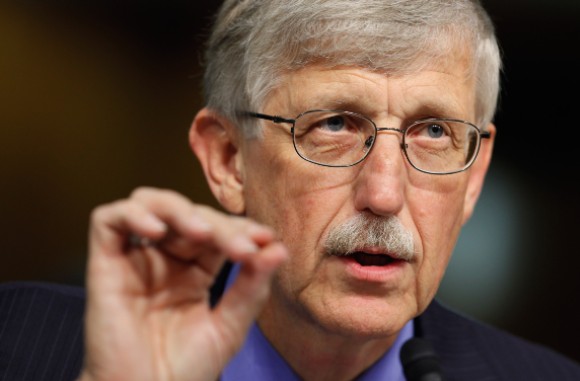
> Vaccine passports: The Washington Post updates readers on the latest thinking inside the White House and Health and Human Services Department about the challenges of endorsing COVID-19 vaccine identifications as a tool for economic reopenings this summer and beyond.
> Global virus: In the United Kingdom, scientific hunters of coronavirus variants lead the global sprint to stay ahead of COVID-19 (The Associated Press). … French President Emmanuel Macron has defended his decision not to completely lock down his country again, but COVID-19 outbreaks and hospitalizations of the critically ill in Paris compelled 41 doctors to sign an opinion article in Le Journal du Dimanche newspaper on Sunday warning that hospitals in the capital are poised to be so overwhelmed with COVID-19 infections that patients may be triaged to choose who receives treatment (The Associated Press). … Brazil is battling a brutal resurgence in COVID-19 cases, making it one of the hardest-hit countries in the world. Latin America’s largest nation accounts for less than 3 percent of the global population, but with an average of 2,400 deaths each day, it accounts for a quarter of daily COVID-19 fatalities worldwide (The Associated Press). … India’s richest state, Maharashtra, is considering imposing a strict lockdown this week after recording the highest one-day jump in coronavirus infections of any Indian state since last March, officials said on Sunday (Reuters).
*****
POLITICS: Georgia’s new voting rights statute stirred disagreement on Sunday. Critics said the law legalizes voter suppression, while Republican supporters said it protects election integrity.
Biden narrowly won the Peach State in November, and two Democrats won Senate special elections in Georgia this year, sending shudders through conservative circles as political analysts chart paths through 2022 and 2024 contests. Democrats insist more legislatures will follow Georgia’s lead, including in Michigan, Texas and Arizona, reports The Hill’s Reid Wilson.
More than 250 measures have been introduced across the country this year that would place new requirements or restrictions on the means of voting, according to the Brennan Center for Justice state voting bills tracker.
The Associated Press explainer: What does Georgia’s election law do?
On Sunday, Sen. Lindsey Graham (R-S.C.) defended the law signed by Republican Gov. Brian Kemp by accusing Democratic critics of playing “the race card.” Progressives believe the statutory changes make it harder for voters of color and those with certain jobs and schedules to vote compared with other demographics (The Hill). GOP elected officials speaking on Sunday agreed with Democrats that Georgia’s decision to make it illegal to hand out water or food to voters standing in long lines is excessive (CNN).
The New York Post: Kemp says the bill he signed into law is not “racist.”
Forbes: Trump, who falsely claimed he lost Georgia to Biden because of “fraud,” on Friday praised the state’s new law and said it’s “too bad” it wasn’t implemented sooner, seemingly suggesting it would have enabled him to win.
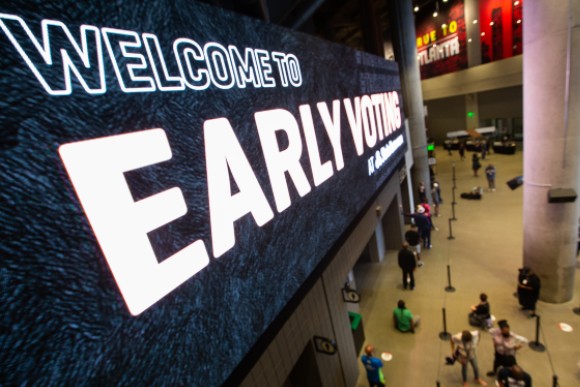
> Trump’s reach: The Hill’s Julia Manchester, who is tracking how Trump is getting involved in upcoming elections, reports the former president will likely steer clear of the Virginia gubernatorial race next year. Democrats won control of Virginia’s General Assembly during Trump’s presidency in 2019, giving the party total control in Richmond for the first time since 1994.
> Senate races: Majority Leader Charles Schumer (D-N.Y.) faces New York voters in 2022 and is taking nothing for granted, reports The Hill’s Alexander Bolton. That means the outspoken, camera-loving senator from Brooklyn will begin visiting all of New York’s 22 counties in April. He has been careful to protect his left flank by teaming up with Rep. Alexandra Ocasio Cortez (D-N.Y.) to provide federal funds to families who cannot afford funerals for coronavirus-related deaths and by partnering with Rep. Ilhan Omar (D-Minn.) and Sen. Elizabeth Warren (D-Mass.) in backing proposals to forgive student debt. Schumer angered some fellow Democrats by getting nearly $3 billion for private schools as part of the $1.9 trillion American Rescue Plan Act, responding to lobbying from New York’s powerful Orthodox Jewish community.
> Money & politics: Major corporations are finding ways to unwind their pledges, issued in January, to withhold campaign contributions for GOP lawmakers who objected to the 2020 presidential election results. Recent financial disclosures show some businesses are now making direct contributions to House and Senate GOP campaign operations that dole out funds to those same lawmakers (The Hill).
> 2024: Biden, 78, last week told reporters he expects to run for a second term, hedging with references to his understanding of fate and the unpredictability of life. His few words on the subject, and his praise for Vice President Harris, froze the field of potential Democratic contenders and could mean a late start to the primary process if the president changes his mind (The Hill).
ABC News: On two issues that helped Biden win the White House — responding to the pandemic and reviving the economy — he enjoys high public approval. Seventy-two percent of Americans favor the work he’s doing to beat the coronavirus, according to a new ABC/Ipsos poll released on Sunday, and 60 percent give him high marks for his handling of the economy. However, majorities of Americans (57 percent) disapprove of Biden’s approach to the surge of migrants at the border and similarly frown on his responses to gun violence following recent mass shootings in Georgia and Colorado.
IN FOCUS/SHARP TAKES
ADMINISTRATION: Transportation Secretary Pete Buttigieg championed bicycle commuting when he served as mayor of South Bend, Ind. Now he’s back at it in Washington, setting an example with his lower carbon footprint, pre-owned bike, proper helmet and safety gear — eager, as the youngest Cabinet member, to appear relatable, policy-focused and energetic. The Hill’s Amie Parnes and Alex Gangitano report the secretary is trying to apply a human touch to the federal bureaucracy and is ready to help Biden and Harris roll out the administration’s infrastructure plan beginning this week.
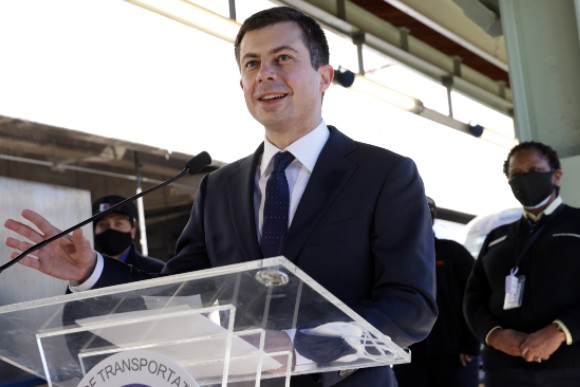
> International policy: China and Iran, both subject to U.S. sanctions, signed a 25-year cooperation agreement on Saturday (CNBC). Asked about what the two nations call a “strategic alliance,” Biden told reporters on Sunday that he’s “been concerned about that for (years).” … Secretary of State Antony Blinken on Sunday suggested the administration won’t take punitive action against China related to the spread of COVID-19, which scientists say originated in Wuhan, China, in late 2019 (The Hill). … The administration is trying to strike a balance between tough talk about China’s human rights violations and rule-bending economic domination globally and support for the Asian community in the United States, reports The Hill’s Laura Kelly and Scott Wong. … The Hill’s Rebecca Kheel describes Biden’s latest thinking on withdrawal of approximately 2,500 remaining U.S. troops from Afghanistan, which he said last week seemed logistically impossible by a May 1 deadline but more likely later this year. … The Biden administration’s gauzy stance toward Cuba could use some definition, according to some lawmakers. The president has said he wants a reset in U.S. relations with the island nation, but that goal is scrambled by domestic politics, U.S. tensions with Venezuela and Cuba’s suspected microwave attacks targeted at U.S. diplomats (The Hill).
More policy headlines: Biden invited Chinese President Xi Jinping, Russian President Vladimir Putin and 38 other heads of government to a U.S.-sponsored virtual climate summit marking Earth Day on April 22-23. China is the world’s single largest emitter of greenhouse gases (RSVPs still pending) (The Hill). … Within weeks, the administration is expected to unveil a new plan to attain U.S. goals set out under the Paris climate agreement and move to tighten environmental protections on some U.S. federal lands previously designated as national monuments. The Biden team also envisions clamping down on climate regulations and has moved to delay, jettison and replace certain rules set in motion by the Trump administration (The Hill). … Biden must decide within days whether to extend a federal ban on evictions during the pandemic as millions of Americans struggle with housing and rent and the policy faces legal challenges (The Hill). For many motel dwellers, the eviction ban provides no relief (The Associated Press). … Top earners skirt taxes on 20 percent of their income, according to a comprehensive new estimate of tax evasion. The top 1 percent of earners account for more than one third of all unpaid federal taxes (The Washington Post).
*****
MORE CONGRESS: Democrats plan a major push to lower drug prices as part of the next round of major legislation. The White House has been coordinating with House progressives, but the Senate is where the proposed policy changes will rise or fall (The Hill).
> Congressional Review Act (CRA): In the regulatory world, the CRA is seen as a powerful tool. Schumer announced on Thursday that Democrats would soon use the law to overturn two different Trump-era regulations, one that weakened methane restrictions and another that limited workplace discrimination protections. But by committing to roll back just two rules, Democrats are taking a sharp turn away from the strategy employed by Republicans, who after Trump was elected used the law on 16 different regulations (The Hill). … The CRA affords Congress a check on the rulemaking activities of federal agencies. The law creates a review period during which Congress, by passing a joint resolution of disapproval later signed by the president, can overturn a new federal agency rule and block the issuing agency from creating a similar rule in the future. Ballotpedia is tracking use of the law HERE.
The Hill’s Jordain Carney also put Schumer on her list of senators to watch when it comes to the future of the filibuster. Others? Sens. Joe Manchin (D-W.Va.), Kyrsten Sinema (D-Ariz.), Chris Coons (D-Del.), Angus King (I-Maine), Jeff Merkley (D-Ore.), and Minority Leader Mitch McConnell (R-Ky.).
> Family leave: Momentum is behind the paid family leave movement as major corporations and public officials embrace the change during the pandemic. More than 190 American companies urged Congress in a recent letter to include the policy in legislation this year. Proponents say the pandemic has underscored the challenges as parents juggle their jobs with a lack of child care options and the need to be home with children who are not in school full-time because of COVID-19 (The Hill).
> Reparations: The Hill’s Marty Johnson reports on the national conversation around reparations for Black Americans after Evanston, Ill., passed the country’s first such program last week.
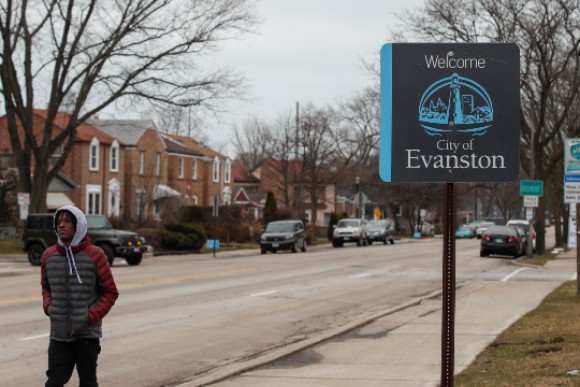
The Morning Report is created by journalists Alexis Simendinger and Al Weaver. We want to hear from you! Email: asimendinger@digital-stage.thehill.com and aweaver@digital-stage.thehill.com. We invite you to share The Hill’s reporting and newsletters, and encourage others to SUBSCRIBE!
OPINION
We cannot end the pandemic without vaccinating kids, by Jeremy Samuel Faust and Angela L. Rasmussen, opinion contributors, The New York Times. https://nyti.ms/2PE4AY8
On hallowed ground: The spot in Minneapolis where George Floyd was killed speaks to those who visit, by Charles M. Blow, columnist, The New York Times. https://nyti.ms/31s0ZiF
Afghanistan pullout isn’t as popular as it seems, by Richard Fontaine, Wall Street Journal commentary. https://on.wsj.com/3lZT6uh
WHERE AND WHEN
The House meets at 10:30 a.m. for a pro forma session with no votes scheduled.
The Senate will hold a pro forma session at 11 a.m. and return for legislative business on April 12.
The president and Harris will receive the President’s Daily Brief at 9:50 a.m. Biden and Harris will receive an update on the federal COVID-19 response at 1:30 p.m. Biden will speak about the government’s coronavirus response at 2:10 p.m. The vice president will attend.
The White House press briefing is scheduled at 12:30 p.m. The administration’s coronavirus update takes place at 11 a.m.
Secretary of State Antony Blinken chairs by virtual hookup the United Nations Security Council briefing and consultations about Syria’s humanitarian issues at 10 a.m. He meets virtually with U.N. Secretary-General António Guterres at 1:05 p.m. Blinken meets virtually at 2 p.m. with U.N. General Assembly President Volkan Bozkir.
INVITATION, Join The Hill’s Virtually Live, “The Future of Defense Summit” at 12:30 p.m. Today’s in-depth discussion includes a stellar group of experts: Director of National Intelligence Avril Haines; Senate Armed Services Committee member Tammy Duckworkth (D-Ill.); House Committee on Foreign Affairs member Adam Kinzinger (R-Ill.); U.S. Army Chief of Staff Gen. James McConville; U.S. Air Force Chief of Staff Gen. Charles Brown Jr.; Michèle Flournoy, co-founder and managing partner of WestExec Advisors; and two former secretaries of Defense, Leon Panetta (D) and Chuck Hagel (R). REGISTER HERE.
Hill.TV’s “Rising” program features news and interviews at http://digital-stage.thehill.com/hilltv or on YouTube at 10:30 a.m. EST at Rising on YouTube.
ELSEWHERE
➔ SUPREME COURT: Justices at 11 a.m. hear an oral argument in Goldman Sachs Group v. Arkansas Teacher Retirement System, a case on securities class-action law (CNBC).
➔ INTERNATIONAL: Since the start of Myanmar’s military coup on Feb. 1, at least 459 civilians have been killed, including more than 100 additional deaths over the weekend. Troops fired at people gathered at a funeral on Sunday, according to witnesses. On Monday, security forces killed a man in the main city of Yangon as activists called on ethnic minority forces in the diverse nation to back their campaign against military rule (Reuters). … In the Suez Canal, the Ever Given container ship stuck in the waterway has been partially refloated this morning, nearly a week after triggering a traffic jam of notable proportions (The Washington Post).
➔ CHERRY BLOSSOMS: Every spring, the nation’s capital makes a fetish of its frothy pink blooming trees around the Tidal Basin. Furious winds on Sunday and feared freezing temperatures ahead on Thursday add to much hand-wringing this morning about potential damage to the “peak bloom” period early in April and whether crowds beginning to gather over the weekend could lead to a total lockdown of the area next month (WTOP). Fortunately for everyone, there’s a BloomCam.
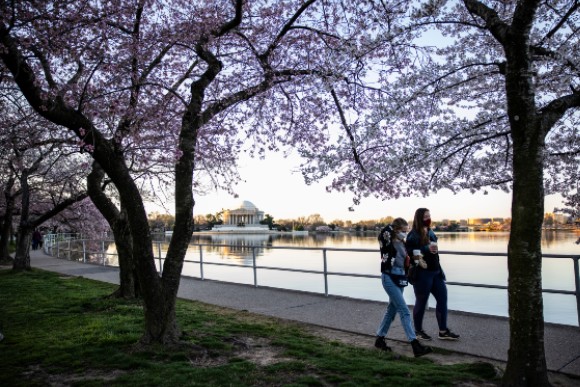
THE CLOSER
And finally … As many sensible people say goodbye to winter and look forward to the warmth of spring and summer, we pause for champion free diver Alexey Molchanov (pictured below), who decided last week to plunge 262 feet (80 meters) through the sounds of crackling ice in Siberia’s Lake Baikal and then swim to the surface in one breath. He set his 20th world record in 2 minutes, 53 seconds. It’s a sport he learned from his mother, who died while free diving in 2015.
Don’t miss the New York Times coverage: “He focused on taking long, deep, rhythmic breaths until his heart rate slowed and he entered a meditative state. Then he sipped the air through pursed lips until his lungs were fully inflated, from his diaphragm to the tiny air pockets between and behind his shoulder blades. Finally, he ducked below the surface, and disappeared.”
Watch 34-year-old Molchanov’s feat HERE. A short Twitter version of his dive is HERE.

Copyright 2023 Nexstar Media Inc. All rights reserved. This material may not be published, broadcast, rewritten, or redistributed. Regular the hill posts







